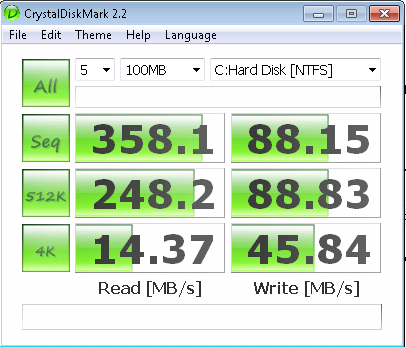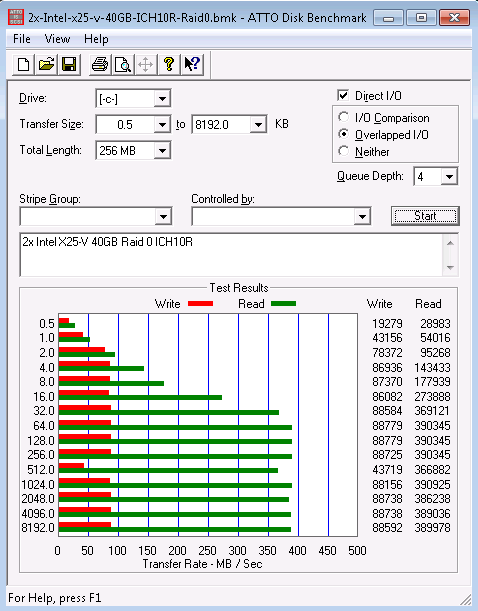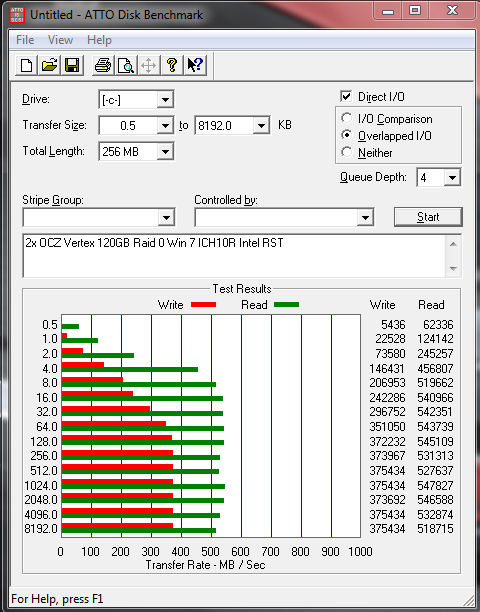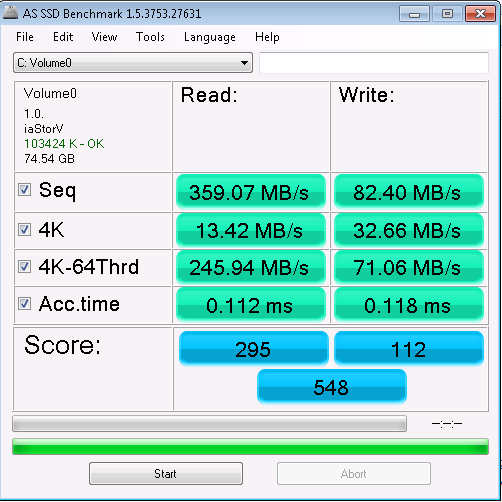The Intel X25-V 40GB drive is well known to be one of, if not the best low-cost SSD on the market at the moment. The SSD is basically an Intel X25 G2 drive with TRIM support except with half the NAND flash memory and using only half of the SSD controller channels. The major impact is well known at this point, the Intel X25-V 40GB drives have poor sequential write performance that is approximately half that of the Intel X25-M 80GB. Of course, with two X25-V’s in RAID 0, write speed is essentially doubled and read speed goes well beyond a single drive.
Test Configuration
I noticed that I have done a poor job listing the test system in articles from the first quarter of 2010 and earlier. As a result, here is test configuration:
- CPU: Intel Core i7 920
- Motherboard: Gigabyte X58-Extreme
- Memory: 12GB of Corsair Dominator GT 1600 C7 DDR3
- Case: CoolerMaster Cosmos S
- Drives (OS): 2x OCZ Vertex 120GB in RAID 0
- SSD: 2x Intel X25-V 40GB in RAID 0
- Controller: Intel ICH10R with Intel Rapid Storage Technology (RST) 9.6.0.1014
- NIC (additional): Intel Pro/1000 PT Quad
- Power Supply: Corsair CMPSU-1000HX 1000w Power Supply
- Host OS: Microsoft Windows 7 Ultimate 64-bit
This system is not the fastest around, however it is plenty to ensure that other hardware is not slowing down SSDs. I will note that the numbers I find in my testing may not be indicative of what one may see on an AMD or NVIDIA chipset.
Intel X25-V 40GB Benchmarks
On to the benchmarks! The Intel X25-V in RAID 0 performance is a fairly well known sum at this point, but this should allow one to compare performance to the Patriot PS-100 32GB drives in RAID 0 which is a much cheaper setup (I got both of my PS-100 drives for $140 combined).
CrystalDiskMark
I have used CrystalDiskMark (and an older one at that at version 2.2) for quite a while now, and so I am providing these results as a point of reference.

Here one sees Intel’s awesome 4K read/ write speeds shine. Other interesting points are the 88MB/s-89MB/s sequential write speed limit and 358MB/s read speed. The 358MB/s is quite a bit faster than a single SATA II channel can handle so it is fair to say that sequential reads of two Intel X25-V’s in RAID 0 will surpass other SATA II drives.
ATTO Benchmark
ATTO has been one of my longstanding favorite benchmarks as it usually gives a different view of drive performance than a lot of the other quick benchmarks available.

The ATTO benchmark shows two trends that really highlight the difference between Indilinx and Intel drives in RAID 0. The X25-V’s are hamstrung by their maximum write performance of about 44MB/s – 45MB/s each. In RAID 0, this translates to a wall between 88MB/s and 89MB/s. This 88MB/s – 89MB/s is the same sequential write limit that was seen in CrystalDiskMark.
Read speeds end up at a decent 380MB/s – 390MB/s. On the other hand, one can see that for a broad spectrum of write sizes, the OCZ-Indilinx drives in RAID 0 perform well also. The Intel X25-V 40GB drives in RAID 0 show an aptitude between .5KB and 2KB (especially for writes), but beyond that the OCZ-Indilinx drives show solid performance. It should, of course, be noted that the OCZ-Indilinx setup has three times the capacity of the Intel setup and was two and a half times more expensive. Just for reference, the OCZ Vertex 120GB drives in RAID 0 ATTO numbers are provided below:

That is quite a difference, but real world, it is not very noticeable except when copying large files to the Intel array.
AS ASSD Benchmark
The AS ASSD Benchmark was developed specifically to test SSDs. I have not included it on previous reviews, but I plan to going forward.

This again is a good result. The sequential write speed lags, but is still about twice that of a single Intel X25-V 40GB and approximately on par with an Intel X25-M 80GB. The sequential write speed was 82.4MB/s with the AS ASSD Benchmark which is slower but in the same ballpark as the CrystalDiskMark and ATTO benchmark result. The 4K and 4K-64 Thrd read results really point to the strength of Intel’s controller architecture.
Conclusion
The X25-V 40GB drives in RAID 0 do provide a strong value proposition. The comparison to the OCZ Vertex 120GB drives in RAID 0 shows that the Intel drives give up some write speed on larger files for small read/ write speed. One area where Intel lags Indilinx is garbage collection and TRIM in the same firmware. That means that TRIM enabled Intel X25-V 40GB drives in RAID 0 do not have the ability to efficiently recapture abandoned space. Then again, for under $250, the dual X25-V 40GB combination provides impressive performance. Unlike the Indilinx RAID 0 results, moving the X25-V did produce some noticeable performance benefits mostly when doing sequential writes (i.e. transferring a file from a network location to the 2x Intel X25-V 40GB RAID 0 array).





I finally purchased an SSD for my laptop (Intel X25-M 80GB gen2) and oh my I have to say that it is a great upgrade, would definitely recommend it. Makes everything much snappier. Also, in video games, it decreases stuttering or FPS drops when the video game is loading new textures since the SSD is so speedy.
I hope Intel hurries up and releases the new RAID firmware with TRIM support.
I wonder how long does it usually take for SSDs performance to start sucking without TRIM and garbage collection.